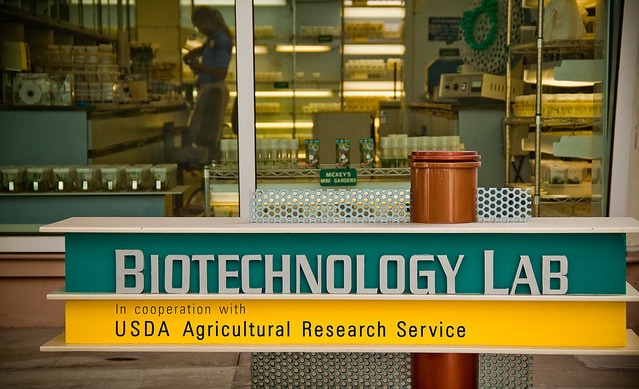This Sunday, if you have an hour, I have a thoroughly interesting report for you to read. The NGO Food and Water Watch just published a document called “Biotech Ambassadors“, in which they analysed the 250,000 U.S. State Department cables that were publicized through Wikileaks (which represented around one tenth of all State Department cables between 2006 and 2009). Their finding: 926 U.S. State Department cables from 113 countries between 2005 and 2009 discussed agricultural biotechnology and genetically engineered crops.

Image by Scott R. Smith, via Flickr CC.
The main purpose of these communiques seemed, according to Food and Water Watch, to create a “concerted public relations strategy by the State Department to improve the image of biotech crops overseas, coordinate with biotech seed companies and press foreign governments to adopt probiotech policies“.
This included sending annual cables to “encourage the use of agricultural biotechnology,” and directing every diplomatic post worldwide to “pursue an active biotech agenda” that promotes agricultural biotechnology. Pursuing such an agenda could mean lobbying foreign governments to adopt pro-GMO policies or laws, opposing the adoption of laws requiring the labelling of GMO products, and engaging in public relation campaigns to convince scientists, government officials or local media of the benefits of gen- and biotechnology.
As Food and Water Watch observe, this strategy is seen as “science diplomacy” by the State Department, which to a certain point is reasonable seeing as the USA are the clear leaders in the biotechnology sector. However, the fact that most firms that dominate the markets are headquartered in the USA also means that the policy is bordering on the most obvious forms of corporate diplomacy on behalf of the big biotech multinationals themselves.
An interesting figure to me was that the seed companies themselves, including Monsanto, DuPont Pioneer, Syngenta, Bayer CropScience and Dow Agrochemical, are more commonly mentioned in the biotech cables than food aid (6.9 percent of the cables and 4.4 percent, respectively). Monsanto alone appeared in 6.1 percent of the biotech cables analyzed between 2005 and 2009 from 21 countries. If the US government were only trying to “publicize that agricultural biotechnology can help address the food crisis“, and were just concerned with feeding the world, why the frequent mentions of the particular companies?
Furthermore, what bugged me most was that apparently the adoption of biotechnology was pushed in legislation and practice particularly in developing countries, although the high capital and input requirements make the use of patented seeds not ideal for smallholder farmers (they would be dependent on the seed companies and have to rebuy seeds as well as the adapted pesticides on a yearly basis, which can lead to high levels of endebtment). Yet, the State Department “encourag[ed] the development and commercialization of ag-biotech products” in the developing world where many “have hesitated to join the biotech revolution” and encouraged embassies to “publicize the benefits of agbiotech as a development tool.” According to the report, one-sixth of the cables (16.6 percent) suggested that biotech crops would improve food security, alleviate the food crisis and foster economic development. In my eyes, this is clearly a one-sided, if not completely misguided representation of the facts. It is all the more dire since the US governmental institutions have a lot of sway in many developing countries that depend on their generosity as donors – meaning that this “science diplomacy” could have real-life implications on the standard of living of the poorest, and the effects will not necessarily be positive.
I would highly recommend you read the entire report to really get the intricacies of the issue, and to make up your own mind; just be aware and maybe take it with a grain of salt since it is positioning itself very clearly in the camp of GMO-opponents and does not hesitate to make these positions apparent. If you don’t have that much time, this Huff Po article does a pretty good job in summarizing the argument, though it takes not provide much in critical analysis of the same and is rather even more radical in its tone and message.
What do you think of this biotech diplomacy strategy? Is it justified to support one of the US’ strongest intellectual sectors or is this just free advertisement for Monsanto et al.?
The US government has the task of supporting and pursuing the interests of US industry abroad so this is true of every industry. Whenever the President travels there is an industry delegation with him. At the final stage it is the decision of the country in question whether ti chooses to opt to work with a particular technology/company. Commentators need to respect the sovereignty of other countries to take decisions that are in their own best interests. Biotechnology can be part of the solution for hunger and malnutrition with which many countries are faced. Since the scientific verdict on biotech is that it is safe for consumption and that is official US policy, there is really no evil conspiracy here as some would like us to believe!
Thanks for this alternative viewpoint! It’s true that the report – and especially the article I cited – do read like a conspiracy theory in places, which is why I indicated their strong ideological leaning. At the same time, if the spread of biotechnology is only possible through the spread of multinational patents and their stronghold over seeds, it’s a strategy that seems debatable to me.
Agree! I am not comfortable with the idea of biotechnology solely in the hands of big companies, I would much rather the US share research resources with biotech efforts in other countries.